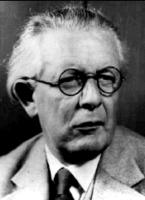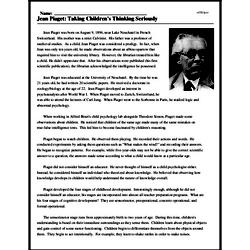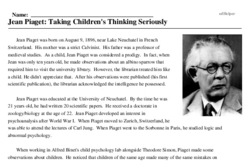Jean Piaget: Taking Children's Thinking Seriously
Jean Piaget was born on August 9, 1896, near Lake Neuchatel in French Switzerland. His mother was a strict Calvinist. His father was a professor of medieval studies. As a child, Jean Piaget was considered a prodigy. In fact, when Jean was only ten years old, he made observations about an albino sparrow that required him to visit the university library. However, the librarian treated him like a child. He didn't appreciate that. After his observations were published (his first scientific publication), the librarian acknowledged the intelligence he possessed.
Jean Piaget was educated at the University of Neuchatel. By the time he was 21 years old, he had written 20 scientific papers. He received a doctorate in zoology/biology at the age of 22. Jean Piaget developed an interest in psychoanalysis after World War I. When Piaget moved to Zurich, Switzerland, he was able to attend the lectures of Carl Jung. When Piaget went to the Sorbonne in Paris, he studied logic and abnormal psychology.
When working in Alfred Binet's child psychology lab alongside Theodore Simon, Piaget made some observations about children. He noticed that children of the same age made many of the same mistakes on true-false intelligence tests. This led him to become fascinated by children's reasoning.
Piaget began to watch children. He observed them playing. He recorded their actions and words. He conducted experiments by asking them questions such as "What makes the wind?" and recording their answers. He began to recognize patterns. For example, while five-year-olds may not be able to give the correct scientific answer to a question, the answers made sense according to what a child would know at a particular age.




